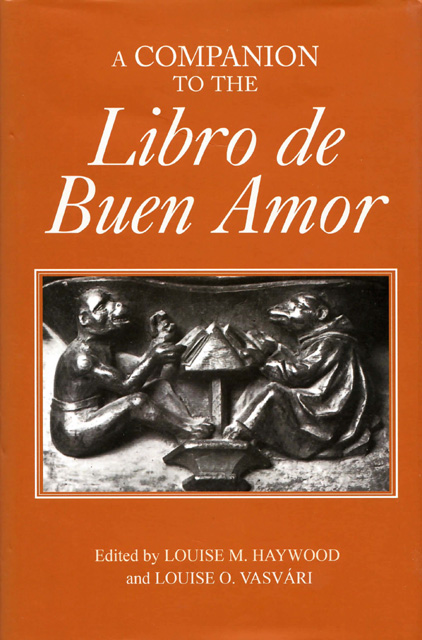Book contents
Introduction: Reading the Libro de Buen Amor Thirty Years On
Published online by Cambridge University Press: 10 May 2023
Summary
The present collection of studies is the second volume published by Tamesis to be dedicated to the Libro de Buen Amor, the first being the ‘Libro de buen amor’Studies, edited by G. B. Gybbon-Monypenny (1970a), who died before we were able to complete this volume. He had kindly agreed to write a Preface for us and it is with great sadness, therefore, that we undertake this task ourselves. That collection of eleven articles, whose authors had their university education in Britain or Ireland (although two were teaching in the United States and one in the West Indies), was, surprisingly, the first ever published on the work of Juan Ruiz and has continued to make a significant impact, particularly on anglophone Buen Amor studies. Partly because of this fact and partly because of the comprehensive range of topics covered, its articles have been among those most cited in Libro scholarship. Although the two editors of the present volume are a full generation apart in age, each grew up intellectually with that 1970 collection as a major source of inspiration. Was it, then, perhaps out of an ‘anxiety of influence’ that in 1999, while together at a conference in Santander, they realized that, thirty years on, there was an urgent need for an equally comprehensive, but now more theoretically-oriented, re-vision of the state of scholarship on the Libro? In the meantime, the project, having taken longer than expected, has also brought us into a new century, so that it is fitting that in this new volume we also attempt to look back Janus-like over the development of Libro scholarship over those thirty years, as well as to anticipate what direction future scholarship might profitably take.
Let us begin by reviewing from the perspective of a new century the achievements and limitations of that 1970 collection, and, to some degree, the earlier scholarship with which it was in dialogue, as well as suggesting selected follow-up studies with which these articles could now be re-read. Our aim, by this method, is not one of criticism but to begin to chart the course of the Libro de Buen Amor’s critical reception.
The first article, ‘Juan Ruiz’s Manipulation of Rhyme: Some Linguistic and Stylistic Consequences’, by Kenneth W. J. Adams, is dedicated to analysis of rhyme schemes, which he considered a prime element of composition in the Libro.
- Type
- Chapter
- Information
- A Companion to the Libro de Buen Amor , pp. 1 - 18Publisher: Boydell & BrewerPrint publication year: 2004



